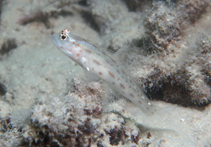| Family: |
Gobiidae (Gobies), subfamily: Gobiinae |
| Max. size: |
5.34 cm SL (male/unsexed) |
| Environment: |
reef-associated; marine; depth range 9 - 21 m |
| Distribution: |
Western Pacific. |
| Diagnosis: |
Dorsal spines (total): 6-7; Dorsal soft rays (total): 11-11; Anal spines: 1-1; Anal soft rays: 11-11. Characterized by whitish body color with four longitudinal rows of dark brown spots (midlateral row spots largest and horizontally elongate); large anterior dark spots of midlateral row often encircled by blue dots; cheeks with row of three dark spots; behind lower edge of eye with oblique blue and yellow mark followed by similar marks on opercle and preopercle; curved blue and yellow line/dashes from behind upper eye to below of dorsal fin origin; lower part of pectoral fin with elliptical white spot; longitudinal scale series 52-56; opening of gill extending slightly anterior to vertical at posterior edge of preopercle; greatest depth of body 4.3-5.0 in SL; rounded caudal fin, shorter than length of head (Ref. 90102). |
| Biology: |
Collected by rotenone and spear from silty, sand and rubble bottoms (Ref. 75863). Also found in lagoons (Ref 90102). |
| IUCN Red List Status: |
Least Concern (LC); Date assessed: 14 November 2023 Ref. (130435)
|
| Threat to humans: |
harmless |
Source and more info: www.fishbase.org. For personal, classroom, and other internal use only. Not for publication.
